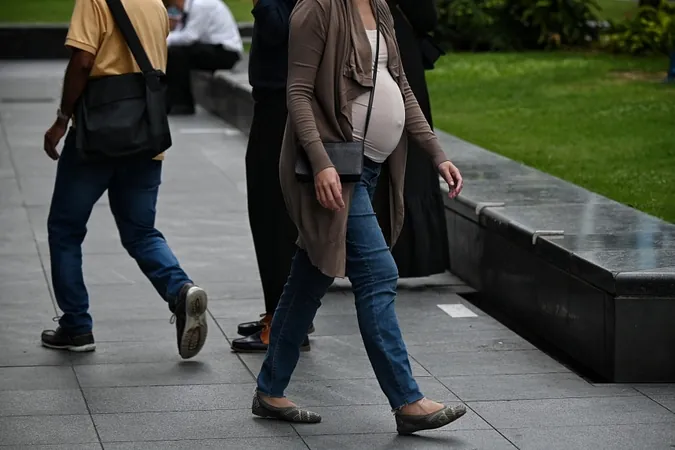
Revolutionary Screening Tool Set to Transform Premature Birth Prevention in Singapore
2024-10-03
SINGAPORE – In a moving account of resilience, 38-year-old Ms. So Bee Leng shares the challenging journey she faced after the premature birth of her son, Ethan Ang, who weighed only 700 grams when delivered at just 24 weeks. His birth came after two harrowing weeks spent in the hospital due to complications like vaginal bleeding and cervix dilation. Mr. Ang faced multiple disabilities stemming from his extreme prematurity, leading to a series of major surgeries over the next five years, including life-altering procedures for his hearing and vision.
Preterm births, defined as deliveries occurring before 37 weeks of pregnancy, remain a significant health challenge worldwide. Currently, identifying mothers at risk is primarily based on their pregnancy history, particularly the occurrence of previous preterm births, which leaves many at-risk women undetected. However, this is set to change with the integration of innovative strategies led by a dedicated team of specialists from KK Women’s and Children’s Hospital (KKH) and Singapore General Hospital (SGH).
Beginning in October 2023, a focused initiative called the Preterm Pregnancy Prevention Programme will mobilize a ten-member team to establish a comprehensive national database. Their goal is to analyze factors linked to preterm births and develop an advanced screening prediction tool to better assess risks associated with premature pregnancies.
Statistics indicate that globally, 13.4 million babies—equivalent to 10 percent of all births—are born prematurely each year, with one million succumbing to complications resulting from their early arrival. Furthermore, in Singapore, 8.2 percent of births in 2023 were premature, a slight decline from 8.8 percent in 2014. Despite these numbers, prematurity remains the leading cause of death for children under five years old.
Reflecting on her own experience, Ms. So faced a heart-wrenching choice during her first pregnancy: to terminate it or endure hospital bed rest until her delivery. Ultimately, she and her husband chose to carry on, a decision that underscored their hope despite the uncertainties ahead.
When Ms. So conceived again in 2023, the shadows of her past loomed large as her doctor warned of heightened risks for premature delivery. However, with the help of the Preterm Birth Clinic at KKH’s Stork Centre, she received vigilant monitoring and underwent a cervical cerclage procedure at just 12 weeks into her pregnancy. This crucial intervention helped facilitate the healthy birth of her daughter, Alysha Ang, at 38 weeks.
Dr. Ilka Tan, a senior consultant in maternal-fetal medicine at KKH, explained the critical nature of such interventions. She noted that while infants can survive outside the womb as early as 24 weeks, outcomes remain bleak for those born even just weeks earlier. Recognizing this challenge, the new screening programme aims to harness data on demographics, biological markers, and cervical length measurements to provide a personalized risk assessment for expectant mothers, enabling targeted preventive measures.
With funding of $500,000 from the Far East Organization backing this ambitious initiative, the prevention programme is well-positioned to address not just the immediate health concerns tied to prematurity, but also the long-term psychological and economic impacts on families. “The stakes are high—not only do premature births pose lasting health risks for the child, but they also create significant stress and financial burden on families,” Prof. Teoh Tiong Ghee, director of maternal and child global health at KKH, articulates.
The Preterm Birth Clinic, operational since July 2021, has seen a significant increase in patient referrals—from 100 in its inaugural year to over 400 in the first nine months of 2024, showcasing the growing awareness and need for specialized care in this area.
As Ms. So reflects on her experiences at the clinic, she emphasizes the thoughtful care she received. “I was monitored by the same doctor throughout my pregnancy, which provided a reassuring sense of continuity and care. Knowing there was a clear plan in place made all the difference,” she stated.
With these promising developments on the horizon, Singapore is ready to take a significant step forward in combating premature births and ensuring healthier futures for both mothers and their babies.


 Brasil (PT)
Brasil (PT)
 Canada (EN)
Canada (EN)
 Chile (ES)
Chile (ES)
 España (ES)
España (ES)
 France (FR)
France (FR)
 Hong Kong (EN)
Hong Kong (EN)
 Italia (IT)
Italia (IT)
 日本 (JA)
日本 (JA)
 Magyarország (HU)
Magyarország (HU)
 Norge (NO)
Norge (NO)
 Polska (PL)
Polska (PL)
 Schweiz (DE)
Schweiz (DE)
 Singapore (EN)
Singapore (EN)
 Sverige (SV)
Sverige (SV)
 Suomi (FI)
Suomi (FI)
 Türkiye (TR)
Türkiye (TR)